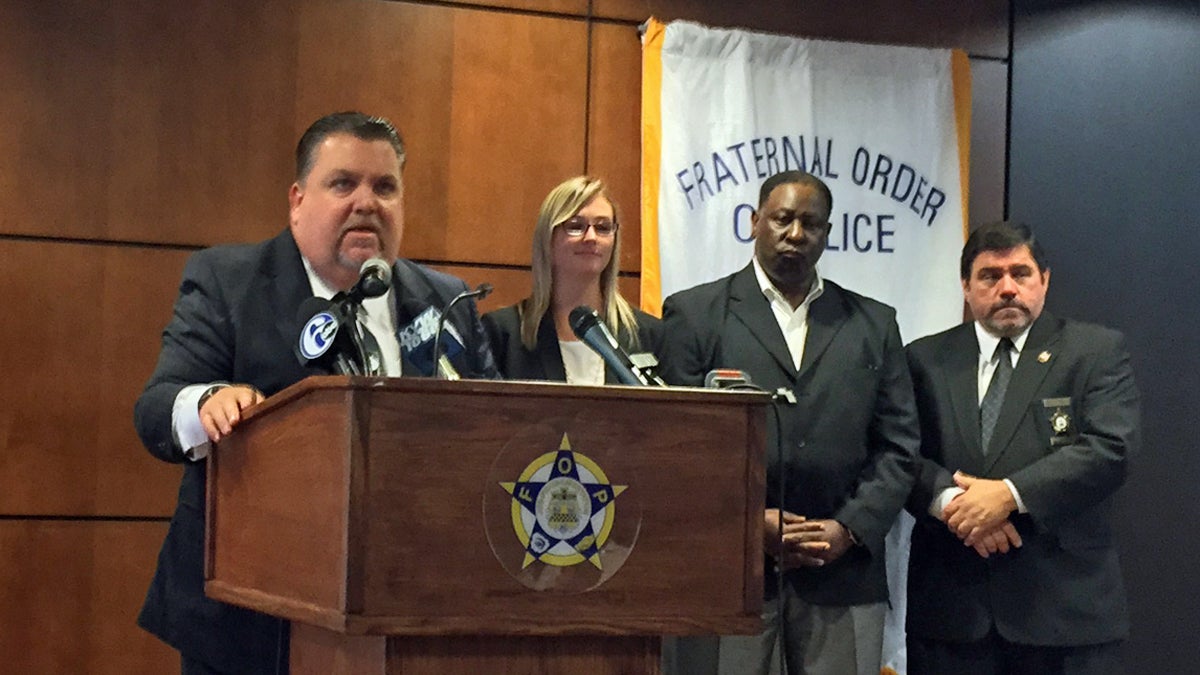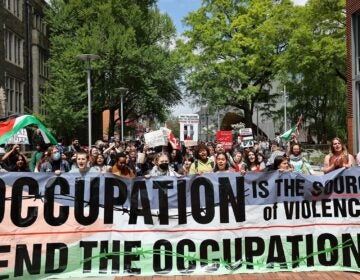Tussle over identifying Philly cops involved in shootings accelerates
Listen
Fraternal Order of Police President John McNesby and state Rep. Martina White say police officers who are involved in shootings deserve privacy. (Bobby Allyn/WHYY)
Is it the people’s right to know, or could it endanger lives?
That question is at the center of the latest tussle between Philadelphia Police Commissioner Charles Ramsey and rank-and-file cops over whether publicly releasing the names of officers who fire their weapons is a worthy policy.
Taking a big swing at Ramsey, the union representing city police is now pushing legislation in Harrisburg attempting to hamstring Ramsey’s ability to identify officers.
When Ramsey announced the change, it was celebrated by activists who’ve called for shooting investigations to be more open.
In March, the U.S. Department of Justice issued 91 recommendations to the Philadelphia Police Department. One of them was to let the public know basic facts about a shooting, including the name of the officer involved, three days after the incident.
According to the federal reviewers, a lack of transparency around shooting investigations has been cementing community distrust.
Acting on the federal guidance, Ramsey this summer reversed the longstanding policy of withholding police identities. Now, names are released three days after a shooting incident, as long as there’s no threat to the officer’s safety.
The head of the police union, John McNesby, wants to put a stop to that.
In a room packed with police at the Fraternal Order of Police Lodge 5 Wednesday, McNesby said the recent slayings of officers in Texas and Illinois demonstrate that law enforcement officials are already under heightened threat.
“It makes it a little more difficult today because you actually have to look over your shoulder,” he said. “We have families, too. We’re not asking for the world. We’re asking for fairness.”
McNesby asked freshman Pennsylvania Rep. Martina White, a Republican whose district includes part of Philadelphia, to sponsor a measure to keep the identities of officers who fire their weapons secret to avoid harassment and possible attacks.
White, who said the bill already has 41 co-sponsors in the Republican-controlled Legislature, said she plans to file it Friday.
Philadelphia police officers shouldn’t “have their fate determined by the media, or a mob with a political agenda,” White said.
Retired officer Rich Costello said it’s the right thing to do. Costello, who took two bullets to the face while on patrol in the 1970s, said officers shouldn’t have to worry about retaliatory attacks in addition to the violence they confront on a daily basis.
“It’s extremely reasonable, and it’ something that would be observed in the case of any other citizen in this country,” Costello said. “Unfortunately, police are guilty until proven innocent. That’s what this bill attempts to combat.”
The Department of Justice has noted that a series of reforms, such as more training focused on the use of deadly force, is needed to soothe the “significant strife” that persists between police and the communities they serve.
Ramsey said if the bill passes, he plans to call on Gov. Tom Wolf to veto it.
“I understand the concern, if there’s threats being made, and if that’s the case, we won’t release the name. But barring that, I don’t any reason for that not to happen,” Ramsey said. “I think it’s well within people’s rights to want to know who is responsible if a police officer is forced to use deadly force. I don’t think that’s asking too much.”
WHYY is your source for fact-based, in-depth journalism and information. As a nonprofit organization, we rely on financial support from readers like you. Please give today.




